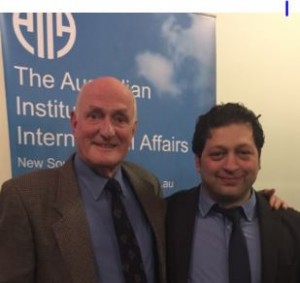Turkish Coup
Dr Murat Yurtbilir lectures on Turkish politics and history at the Centre for Arab and Islamic Studies at the ANU. On Tuesday 6 September, he was our guest at Glover Cottages in Sydney, where he explained to a large and curious audience some of the complexities of the attempted coup in Turkey on 15 July, 2016.
Murat said the coup was allegedly carried out by adherents of the Turkish preacher Fethullah Gülen who lives in the United States. Variously described as the Ottoman Empire of the Mind, or an Islamic Opus Dei, the Gülen movement is said to combine nationalist beliefs of the Ataturk Republic with a traditional but flexible and moderate Islamic faith. It operates schools and universities in 160 countries, most in Turkey, and has many thousands of adherents in the Turkish Army, judiciary, financial institutions and the media. Before the coup its newspaper Zaman was the most widely read in Turkey. The Dutch government had cause to investigate it in 2008, declared it relatively benign, and cleared it of terrorist or subversive motives.
The coup was ruthlessly put down by President Recep Tayyip Erdoğan. Once a semi-pro football player, Erdogan was mayor of Istanbul from 1994 to 1998, prime minister from 2003 to 2014, and president since 2014. He was arrested for religious intolerance in 1998, but thenceforth abandoned openly Islamist policies. His party, AKP, (Justice Development Party), was formerly allied to Gülen, but following the coup he designated gülenistas as terrorists. Capitalising on his popularity and crowd psychology, Erdoğan called ‘the people’ into the streets. Those who did requisitioned tanks and shot at each other. Chaos ensued and bewildered soldiers did not know what was going on. But did the coup have any coherent form? Were they all gulënistas? Not necessarily. Was it Kemalists versus Islamists, Atlanticists against Eurasianists, was it organised by Islamic clerics, or all or none of the above? Dr Murat had no definitive answers, but he identified various activists with a mixture of motives.
In any event, for good measure, Erdoğan arrested a whole echelon of brigadiers as well as thousands of lecturers, teachers, jurists and public servants from the Ministries of Education and the Interior. He declared a state of emergency and by-passed parliament to rule by decree. A witch hunt with much cruelty followed. He demanded the United States return Gülen to Turkey to face trial. This is unlikely to happen.
Murat forecast that instability in Turkey would continue for some time. But the country will remain in NATO, maintain militarily assets in Syria, and hold onto its relations with Russia, tenuously restored following the shooting down of a Russian fighter jet last December. It now has a dearth of senior officers in the Army, but the Army is the second largest in NATO (after that of the United States), and will remain effective. And Erdoğan will continue to rule, if not in tranquility, for the time being.
Report by Richard Broinowski
